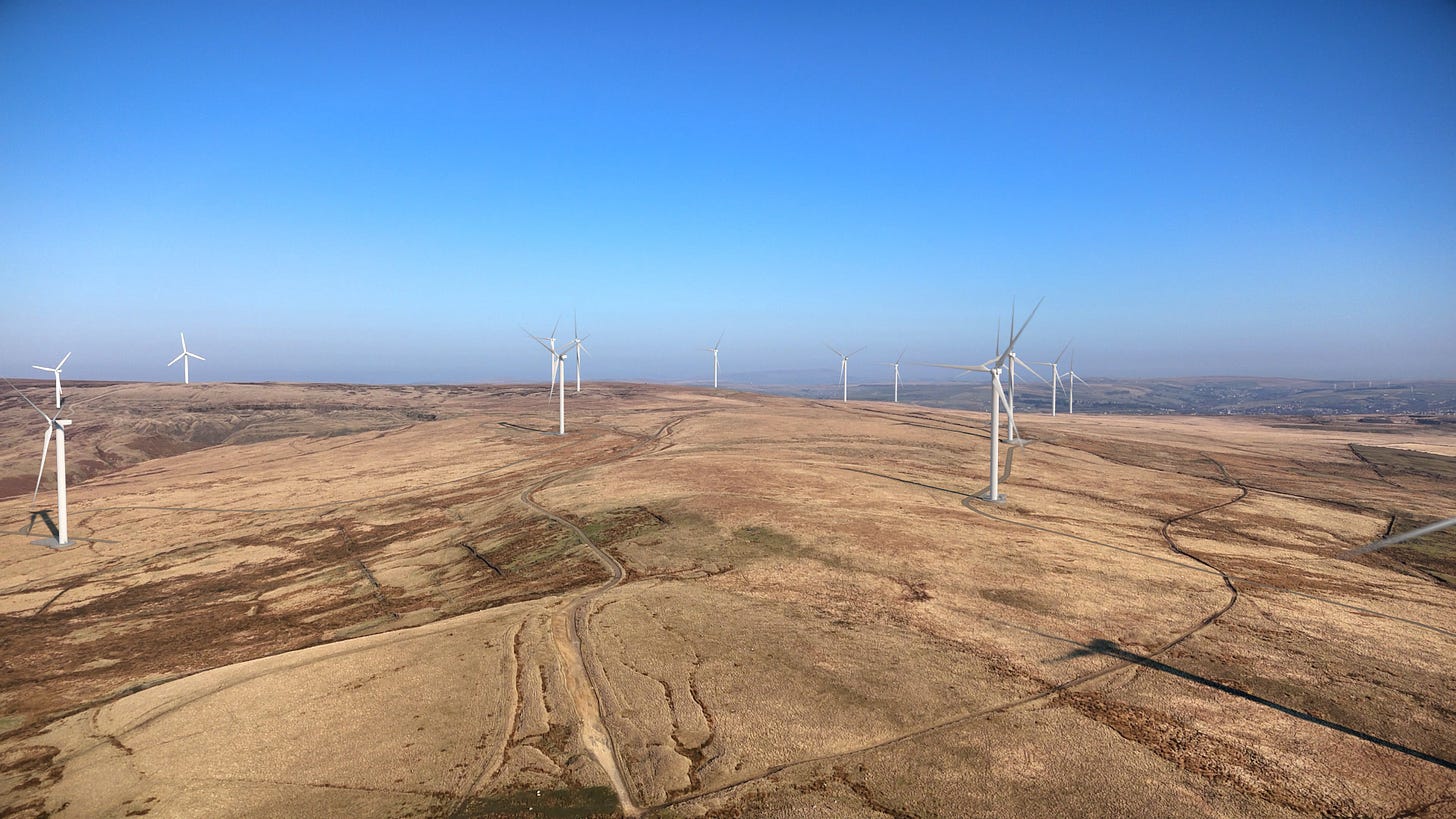Scout Moor II on the hills of Lancashire set to be England's largest onshore windfarm
Plus: We hear from the leader of a racial inequality charity in Accrington + a Burnley Covid bounceback loan fraudster exposed
Hello and welcome to our weekend edition of The Lancashire Lead,
Luke’s taking a well earned rest this weekend (in the fields of Kendal Calling, so how restful it will be we’re not sure but joyful yes, hopefully as long as the weather has held!) but the Lancashire Lead continues.
We welcome Hameeda Khan to write for us in this edition, set against a backdrop of rising racial tensions - stoked often by Reform and their allies - she explains what she feels is needed to get people to move beyond hateful words (often online) and true racial equality both here in Lancashire and beyond. Hameeda’s words come amid a large-scale march by Britain First in Manchester during Saturday afternoon - with a counter-protest also taking place.
There’s also a look at the Scout Moor II plans - we’ll dive into these in more detail in the weeks ahead - but there will be a lot of eyes on the decisions made by Rossendale Council as to whether there is a serious commitment to green energy. Or whether NIMBY-ism will win out.
And for paid subscribers, we reveal how a fraudster from Burnley used the ironically named Legit Ltd to wrongly claim more than £50k government cash in a Covid bounce back loan. Not the first time we’ve revealed wrongdoing by business people pilfering government cash which was meant to be helping during the pandemic, not lining pockets.
Largest onshore windfarm in England set to rise on the hills of Lancashire
by George Lythgoe
Long-awaited plans for England’s largest onshore windfarm have now officially been tabled.
Scout Moor II, located on the South Pennine Moors between Rossendale and Rochdale, would see 17 wind turbines built just north of Rochdale. The wind farm would be able to generate up to 100MW of clean electricity, enough to power around 100,000 homes annually, according to developers.
Cubico Sustainable Investments, the energy company behind the plans, say the amount of electricity generated could power around 77 per cent of all households in Rossendale and Rochdale combined.
Scout Moor sits between Rochdale, Edenfield, and Rawtenstall and is already home to 26 wind turbines. The new wind farm would see bigger, more powerful turbines created, with the ability to generate more electricity than any other onshore wind farm in the country.
This scheme is the first of its kind to come forward since planning rules were changed to support new projects. The previous Conservative government brought in new planning rules that effectively ruled out new onshore wind farm developments back in 2015, which has since been eased.
Cubico says these plans mark a significant step in helping the country meet its climate goals, reduce reliance on imported energy, and unlock the full potential of homegrown renewables.
Despite this, there are concerns logically about the scheme from the campaign group ‘Say NO to Scout Moor 2’. They believe these new turbines will be higher than Blackpool Tower, dominate the valley, and provide little benefit to the environment.
The campaigners fear the high level of concrete used to keep the turbines standing would cause irreversible damage to the peatlands in the area.
In response to these concerns, Cubico is also proposing the delivery of a major moorland restoration scheme. This will focus on improving and protecting the unique peatland across the site, rewetting the moor, restoring native vegetation, and improving habitats for local wildlife.
Peter Rowe, development manager at Cubico said: “Scout Moor II is a chance for Rossendale and Rochdale to lead the UK into a clean energy future – creating jobs, supporting the local economy and backing Britain by producing secure, homegrown energy.
“We’ve been listening closely to what people have told us during the consultation process, and we’re incredibly grateful to everyone who has taken the time to engage with us. Their input has shaped a stronger scheme that we believe delivers for local communities and supports national energy goals.
“We understand that new developments like Scout Moor II raise important questions, and that local communities must see real and lasting benefits. We’re committed to working closely with the Council, community groups and residents as the process moves forward.”
A long-term Community Wealth Fund has also been proposed, delivering £20 million over the lifetime of the wind farm. It would offer a guaranteed £600,000 per year, linked to inflation, and based on £6,000 per MW of installed capacity.
If three per cent of the wind farm’s gross annual revenue exceeds this amount, the higher figure will be paid instead. This ensures the community benefits directly from the project’s ongoing success.
The fund will be managed by a newly formed and independent Scout Moor Development Trust, chaired by a community liaison group made up of local representatives. Its purpose is to invest money back into the local community.
If approved by Rochdale and Rossendale councils, the scheme would contribute towards the UK’s target to triple onshore wind capacity by 2030 and bring significant investment to the area, says Cubico.
Why racial equity work needs white support – and why silence isn’t neutral
By Hameeda Khan
It has been one year since the riots that shook many of our towns. For me, and for PEP (People Empowering People) Enterprise CIC – the organisation I lead in East Lancashire – it was a frightening and defining moment.
We were forced to shut down vital services supporting refugees and those seeking asylum, to protect them from rising hostility. A staff member’s young family was racially attacked, just five minutes from our office. It was a hard time to be visibly Muslim or from a Global Ethnic Majority (GEM - representing 80% of the world’s population) background. I am both.
One year on, and we are again seeing far-right protests erupting outside hotels where those seeking asylum are residing and the likes of Britain First drawing hundreds of people to march through Manchester city centre.
It is another clear sign that the racism which drove those riots has not gone away.
We must stop avoiding the uncomfortable truths about race in Britain. We urgently need deliberate and honest efforts to educate ourselves about race and the realities of racism.
Because without real understanding, fear thrives – and racism remains unchallenged.
Much of today’s Equality, Diversity and Inclusion (EDI) work is still performative – well-meaning, but often surface-level.
When GEM voices are missing from the design and leadership of this work, it loses its power to create real change.
Anti-racism should be uncomfortable – especially for those who benefit from privilege.
If you are white in the UK, your race is not something you are made to defend or explain. You are not stopped by police, or made to prove you belong. That is privilege. And with privilege comes responsibility.
Racism is not just abuse or slurs. It is being overlooked in the workplace. It is being labelled aggressive for simply asserting yourself.
It is speaking up and being shut down and expected to stay quiet for the comfort of others.
And when we speak up, we are met with silence or defensiveness. That reaction is not neutral – it is part of the problem.
This work needs Allyship, it is not a badge, it is affirmative action wherever it appears, not just when it is easy.
It is using your access to make space, to speak out, to challenge injustice.
Racial equity will not come from statements and slogans. It will come when more people choose courage over comfort.
And the time to choose is now.
About the author: Hameeda is founder and chief executive of PEP Enterprise CIC based in Accrington who are on a mission to tackle racial inequality in the UK.
Covid bounce back loan fraudster exposed
by Jamie Lopez
A Burnley man took over a shell company named Legit Ltd - and used it fraudulently to bank £50k for himself.
Keep reading with a 7-day free trial
Subscribe to The Lancashire Lead to keep reading this post and get 7 days of free access to the full post archives.





